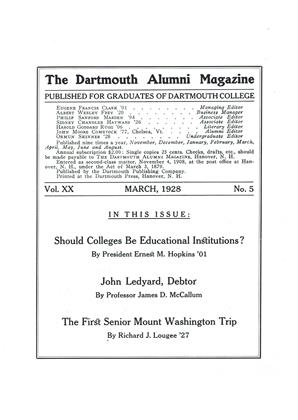After all is said and done, the virtue of any college lies not in its mere bigness, despite the appearance of a popular belief that size is a virtue, as manifested by megalomaniac outgivings by the thoughtless. What a college does with the material submitted to it, whether on a small scale or a large one, must naturally be the real test. There is room for the belief, certainly, that the smaller the college, the better the chance to put a higher polish on the material—but even that is subject to qualification, in that the small college must have a teaching force adequate to its size, just as surely as the larger college, plus the possibility that in matters of material plant it will enjoy more limited advantages than its greater neighbor.
It is an age in which bigness seems to be worshipped—no doubt unduly, and to the prejudice of more logical considerations. Some things remain undisputed however, as elements conferring a special advantage on collegiate gatherings of a few hundred, as contrasted with those of several thousand—among them the better chance for intimate acquaintance among the students and a somewhat more lively prospect of maintaining a democratic spirit. It is a matter for congratulation, we believe, that Dartmouth's growth has not thus far threatened to surpass the limitations within which a healthful democracy of spirit may flourish and has by no means outstripped the capacity of the institution to keep pace with the fundamental needs which growing numbers impose, in the form of accommodations and teachers. A country college like ours seems to be close to the line, at 2000 students and augmentation beyond that size in current circumstances would appear to be a matter so serious as to warrant the most sober consideration ; but it would be rash indeed to dogmatize in view of the changes which have taken place already within the past two decades. It may be well for our own fellowship to be devoutly grateful for a growth which is great without being too great to be handled with address.
 View Full Issue
View Full Issue
More From This Issue
-
 Article
ArticleSHOULD COLLEGES BE EDUCATIONAL INSTITUTIONS?
March 1928 By President Ernest Martin Hopkins -
 Class Notes
Class NotesClass of 1899
March 1928 By Louis P. Benezet -
 Class Notes
Class NotesClass of 1899
March 1928 By Louis P. Benezet -
 Class Notes
Class NotesClass of 1927
March 1928 By Doane Arnold -
 Lettter from the Editor
Lettter from the EditorCOMMUNICATIONS
March 1928 -
 Class Notes
Class NotesClass of 1918
March 1928 By Frederick W. Cassebeer








